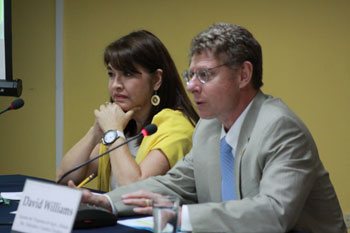Political agreement must support agriculture in negotiations on climate change

San Jose, Costa Rica, March 21, 2013 (IICA). The ability of the industrialized and developing countries to reach a political agreement, one in which it is understood that the capacity to lower gas emissions in agriculture varies from country to country, is the greatest challenge the sector must overcome if it is to play an important role in global negotiations on climate change.
During a technical forum organized by the Inter-American Institute for Cooperation on Agriculture (IICA), the Executive secretary of the United Nations Framework Convention on Climate Change (UNFCCC), Christiana Figueres, recalled that past efforts had been successful in ensuring that agriculture would be included in the negotiations, but that a political agreement was now needed for the countries to establish a program for lowering emissions and taking actions aimed at adapting the sector to climate change.
According to Figueres “Developing countries cannot commit at this time to lowering emissions, especially in agriculture. However, it may be possible to provide them with incentives and to determine the differentiated role to be played by the industrialized nations, for them to promote sustainable agriculture within their boundaries.” The video containing Figueres’ comments is available on the IICA channel on YouTube (video only in Spanish).
“I invite you, I challenge you, to seek a political solution to this challenge that will enable Latin America, as a region, to put solutions on the table,” she added. The negotiations to reach agreement on this topic will get under way in June.
During the Forum, held at IICA Headquarters and transmitted over the Internet, Deputy Minister of Agriculture and Livestock Farming of Costa Rica, Tania Lopez, delivered a progress report on the seven exceptional mitigation and adaptation strategies which her country had presented at the most recent Conference of the Parties of the UNFCCC (COP18), held in Qatar in 2012.
Several of these strategies come from the business sector. “The participation of the private sector is very important in finding solutions to the challenges posed by climate change. With a clearly designed institutional framework, companies can react more effectively,” she said.
Lopez and Figueres thanked IICA and other cooperation agencies for the technical assistance they provide to the countries so that they can participate actively in the negotiations on climate change, and in particular in the identification of opportunities for action in the agricultural sector.
According to David Williams, Manager of IICA’s Agriculture, Natural Resources and Climate Change Program, “The countries of Latin America and the Caribbean have much to contribute to these negotiations, with several nations already providing their agricultural sectors with support in lowering emissions and adapting to climate change. Our participation in this global process is an opportunity to share challenges, solutions and successful experiences of our region with the rest of the world.”
Specific efforts
As part of the support the Institute provides throughout the hemisphere to enable agriculture to more effectively face the challenges of climate change, it has developed a technological platform for the compilation and dissemination of up-to-date information on topic, as a means of strengthening the technical capabilities of relevant decision makers.
The platform was presented at the technical forum. In addition to the actions taken in Costa Rica, mitigation and adaptation initiatives undertaken in Uruguay and Mexico were also explained.
Magadalena Preve, of the Climate Change Unit of the Ministry of Housing, Territorial Planning and Environment of Uruguay, explained that a program had been launched in her country to reduce the vulnerability of small- and medium-scale livestock farms, especially those located in the areas most susceptible to drought, to climate change and variability.
In Mexico, a water supply vulnerability map had been prepared to determine which areas of the country and what type of producers required greater support to use water more efficiently in agricultural activities.
Waldo Ojeda, of the Mexican Water Technology Institute (IMTA), said that in his country, irrigated agriculture accounted for nearly 60% of total agricultural production, even though less than one third of the area under cultivation is used for irrigated agriculture.
For more information, contact:
david.williams@iica.int